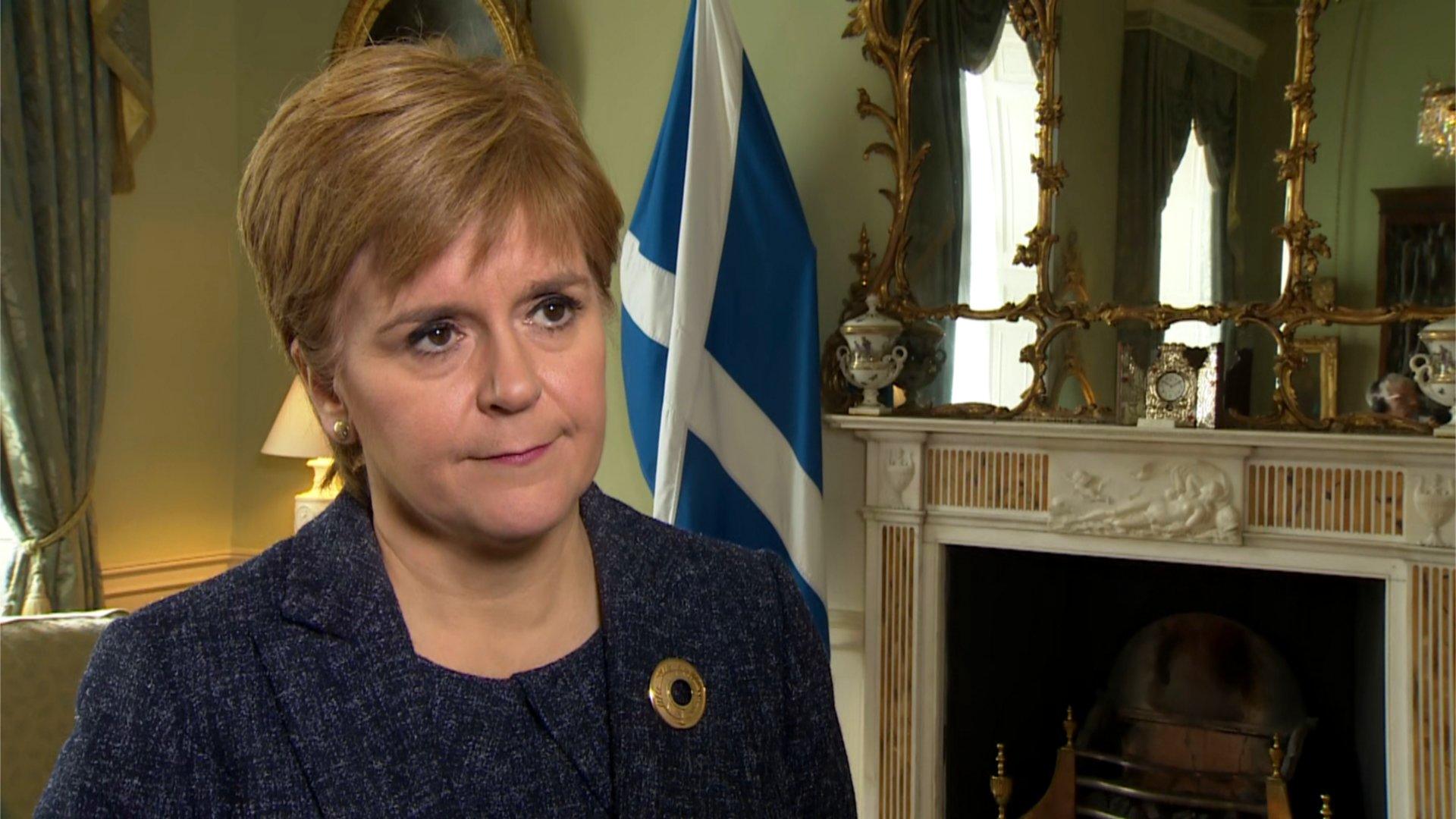A crucial constitutional court case
- Published
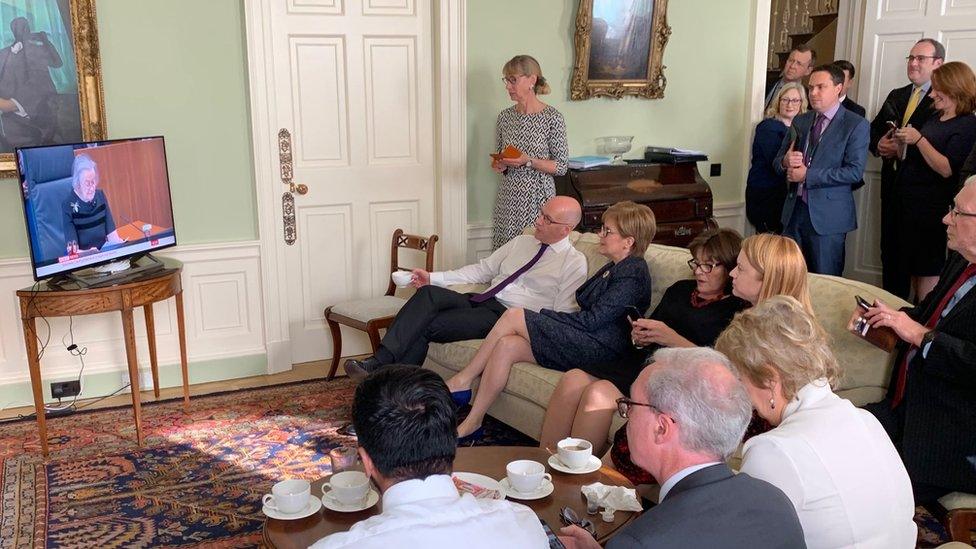
Nicola Sturgeon watched the judgement in the company of her cabinet
There were, we are told, no unseemly yells. No cheering, no stamping of ministerial feet. Instead, Scotland's cabinet quietly observed the Supreme Court verdict on the BBC News Channel, affording it polite and seemly applause.
One can only envisage that the scene was rather different on the other side of the Atlantic when the prime minister rose early (or was awoken) to learn the result of the judicial deliberations.
Just imagine, for a moment, that you are the civil servant or diplomat tasked with telling Boris Johnson that his side has lost this crucial constitutional case. Unequivocally and unanimously lost.
"Er, sorry to disturb, prime minister, but there is news from London. From, eh, the, ah, Supreme Court…."
"Good news?"
"Ah, no, prime minister…"
The decision has, of course, been warmly welcomed by the litigants on the other side and their supporters. The Westminster Parliament will resume, to use the Speaker's description.
It will not be "recalled" - because the prorogation was unlawful and thus null and void. It was a non-prorogation. A blank sheet of paper, in Baroness Hale's memorable phrase.
The Supreme Court declared "Parliament has not been prorogued"
Umpteen politicians and activists have suggested that the PM might now usefully consider his position, given that he has been found by the UK's highest court to have breached the law.
This Mr Johnson declines to do. Or, rather, he has considered his position for a moment, concluded that it was already hideous and has swiftly decided that the only option is to continue in office, seeking a Brexit deal.
Anyone else entitled to feel pleased? Those Lords in the Inner House of the Scottish Court of Session whose ruling that prorogation was unlawful has now been upheld (along with the appeal by Gina Miller against a contrary finding in the English High Court).
Not only that. The Supreme Court ruling also follows the essence of the Inner House argument - to the effect that the courts are entitled, nay obliged, to consider the practical implications of political decisions, not just their absolute or theoretical working.
Their Scottish lordships concluded that the extended prorogation or suspension of Westminster was designed to stymie Parliamentary scrutiny, particularly with regard to a no-deal Brexit. The Supreme Court agrees.
Fine word, stymie. In part, it has a golfing origin, as I recall. To stretch this further, the PM is now bunkered. In the whins. Out of bounds.
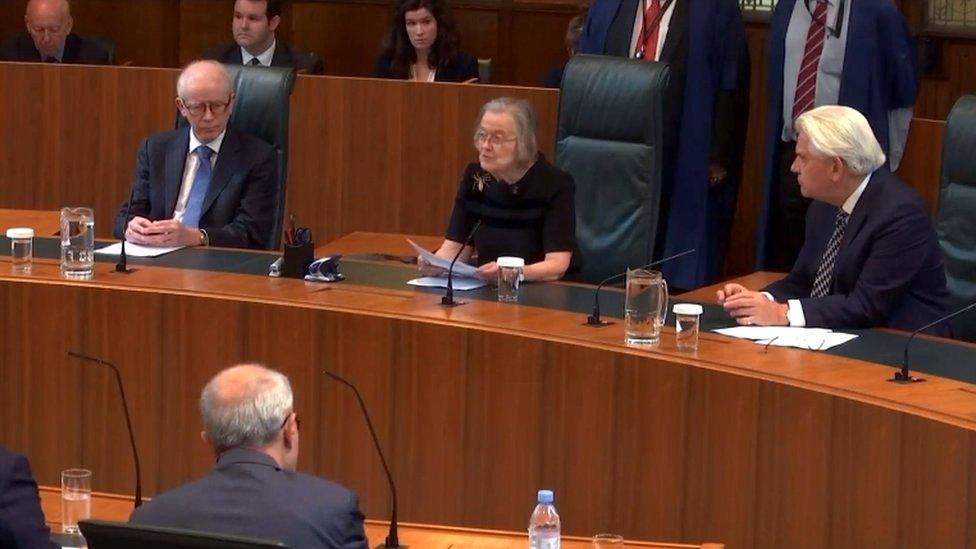
Lady Hale and the ten other Supreme Court judges were unanimous in finding the prime minister had acted unlawfully
However, glance, if you will, at the full judgement. It emphasises from the outset that the court's ruling is NOT about Brexit. It offers no view as to when and on what terms the UK is to leave the European Union.
It is, solely, about the behaviour of the prime minister and his advisers in counselling Her Majesty the Queen to prorogue Parliament in the run-up to a new Gracious Speech on the 14th of October.
But is not the Royal prerogative untouchable, beyond the reach of the courts? No, say the justices, citing inter alia a case from 1611 when it was said that the king "hath no prerogative but that which the law of the land allows him".
And what of those practical implications? Again, the court cites precedent including the Claim of Right, an Act of the pre-Union Scots Parliament from 1689.
This notes that Parliament ought to be frequently called and freedom of speech permitted in order to facilitate "the redress of all greivances and for the amending, strenthneing and preserveing" of the law.
But is not the prime minister accountable to the sovereign Westminster Parliament, rather than the courts, on constitutional matters? Up to a point, Lord Copper.
Political accountability, today's judgement rules, does not mean that ministers are "immune from legal accountability to the courts."
In summary, "it must therefore follow, as a concomitant of Parliamentary sovereignty, that the power to prorogue cannot be unlimited."
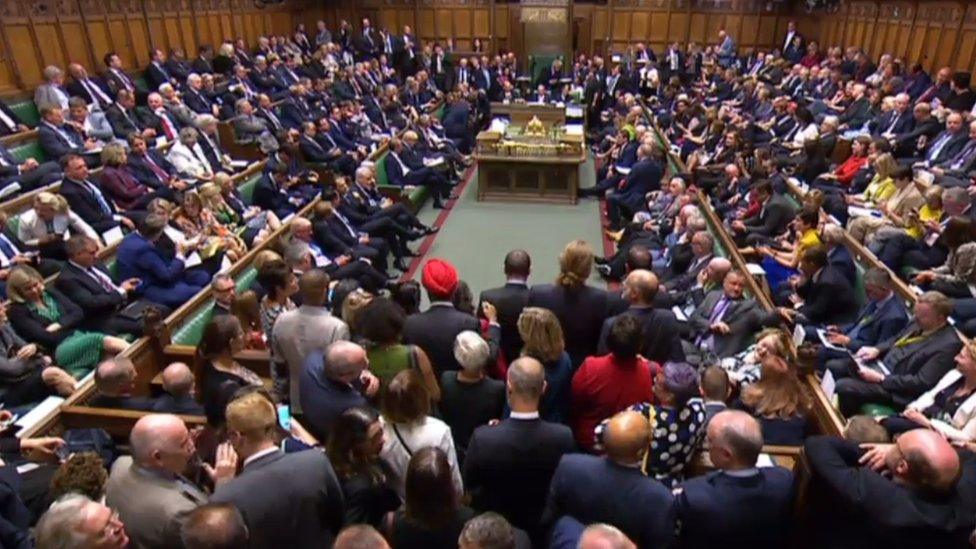
MPs will be back in the Commons tomorrow
Once again, as the Court of Session opined, no absolute discretion, no absolute immunity. But practical considerations. The longer the prorogation, the "greater the risk that responsible government may be replaced by unaccountable government: the antithesis of the democratic model".
So what next? The Westminster Parliament will indeed resume tomorrow. Presumably, with a statement from the PM and pressure from opposition parties.
But to what effect? The temptation placed upon opposition leaders to table a motion of no confidence in the PM's government must be huge.
Against that, though, is the consideration that they have agreed that the first priority remains the pre-emption of a no-deal Brexit.
Politicians are pre-programmed to demand an election in all circumstances. But the times are so fluid, the discourse so uncertain and anxious that few could predict the outcome.
Folk are angry. Angry and discontented. They want it all to end. They want the focus to return to their domestic concerns. Is it possible to say, with certainty, upon whom they might visit that disquiet at the polls?
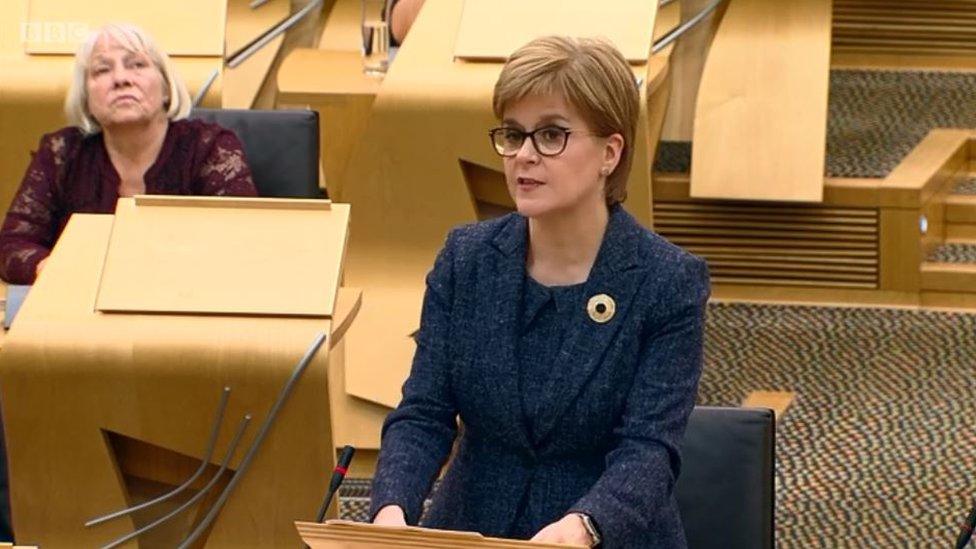
Nicola Sturgeon made a statement to MSPs in the wake of the judgement
Nicola Sturgeon, for one, sounded a caveat in a thoughtful, analytical and well-crafted statement at Holyrood.
She made four points. The PM was culpable and should resign. Westminster must resume. The UK government must respect the Benn Act, pre-empting a no-deal Brexit.
And, yes, the UK government must be removed from office - but only once that risk of a no-deal departure had been guaranteed.
Ms Sturgeon, of course, added a further, general point. That Scotland should not remain at the whim of "an extreme, out of touch, law-breaking" UK government.
There arose Jackson Carlaw, he who has the joyous task of shepherding Scottish Tory MSPs, on an interim (but presently prolonged) basis. His contribution was dignified, mild and moderate. As befits one whose UK leader has just been bluntly chastised by the courts.
And Mr Johnson himself? This is a simply dreadful judgement upon his conduct in office. He has been found to have acted unlawfully. In formal advice to the Queen. It doesn't get much worse.
Already, though, we see the tiny, floating strands of an effort to regroup. The court may have said that their ruling is unconnected with Brexit.
But Mr Johnson's post-verdict plea in mitigation is definitely Brexit based. He asserted, once again, that those who challenged his actions were also challenging his fundamental policy. That of leaving the EU.
One can expect him to pursue that in the Commons tomorrow and beyond. He will argue that, despite the court verdict, he intends to pursue a renegotiated settlement with the EU, to permit Brexit by the end of October.
Expect him, privately, to go further. To say to the European Research Group on his own side and to the DUP that there is now a sustained, credible and growing challenge to Brexit in its entirety. To leaving the EU, full stop.
That the Supreme Court ruling, despite its own preamble, is in response to litigation which forms part of that challenge.
And that, if the ERG and DUP want to stymie such a challenge (to use the word of the day) then they must stand by to vote for whatever he can scratch from the EU in terms of a revised deal, if he is given the chance.
- Published24 September 2019
